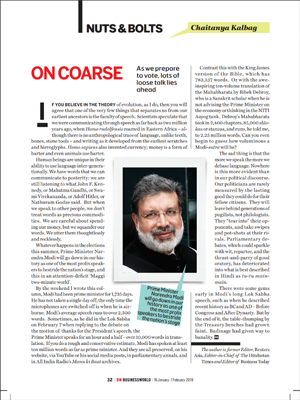ON COARSE
[Business World]
Published date: 9 Jan 2019
If you believe in the theory of evolution, as I do then you will agree that one of the very few things that separates us from our earliest ancestors is the faculty of speech. Scientists speculate that we were communicating through speech as far back as two million years ago, when Homo rudolfensis roamed in Eastern Africa – although there is no anthropological trace of language, unlike teeth, bones, stone tools – and writing as it developed from the earliest scratches and hieroglyphs. Homo sapiens also invented currency; money is a form of barter and even animals use barter.
Human beings are unique in their ability to use language inter-generationally. We have words that we can communicate to posterity: we are still listening to what John F. Kennedy, or Mahatma Gandhi, or Swami Vivekananda, or Adolf Hitler, or Nathuram Godse said. But when we speak to other people, we don’t treat words as precious commodities. We are careful about spending our money, but we squander our words. We utter them thoughtlessly and recklessly.
Whatever happens in the elections this summer, Prime Minister Narendra Modi will go down in our history as one of the most prolix speakers to bestride the nation’s stage, and this in an attention-deficit ‘Maggi two-minute world’.
By the weekend I wrote this column, Modi had been prime minister for 1,735 days. He has not taken a single day off; the only time the microphones are switched off is when he is airborne. Modi’s average speech runs to over 2,500 words. Sometimes, as he did in the Lok Sabha on February 7 when replying to the debate on the motion of thanks for the President’s speech, the Prime Minister speaks for an hour and a half – over 10,000 words in translation. If you do a rough and conservative estimate, Modi has spoken at least ten million words so far as prime minister. And they are all preserved, on his website, via YouTube or his social media posts, in parliamentary annals, and in All India Radio’s Mann ki Baat archives.
Contrast this with the King James version of the Bible, which has 783,137 words. Or with the awe-inspiring ten-volume translation of the Mahabharata by Bibek Debroy, who is a Sanskrit scholar when he is not advising the Prime Minister on the economy or thinking in the NITI Aayog tank. Debroy’s Mahabharata took in 2,400 chapters, 85,000 shlokas or stanzas, and runs, he told me, to 2.25 million words. Can you even begin to guess how voluminous a Modi-sutra will be?
The sad thing is that the more we speak the more we debase language. Nowhere is this more evident than in our political discourse. Our politicians are rarely measured by the lasting good they could do for their fellow citizens. They will leave behind generations of pugilists, not philologists. They “tear into” their opponents, and take swipes and pot-shots at their rivals. Parliamentary debates, which could sparkle with wit, repartee, and the thrust-and-parry of good oratory, has deteriorated into what is best described in Hindi as tu-tu main-main.
There were some gems early in Modi’s long Lok Sabha speech, such as when he described recent history as BC and AD – Before Congress and After Dynasty. But by the end of it, the table-thumping by the Treasury benches had grown faint. Badinage had given way to banality.






